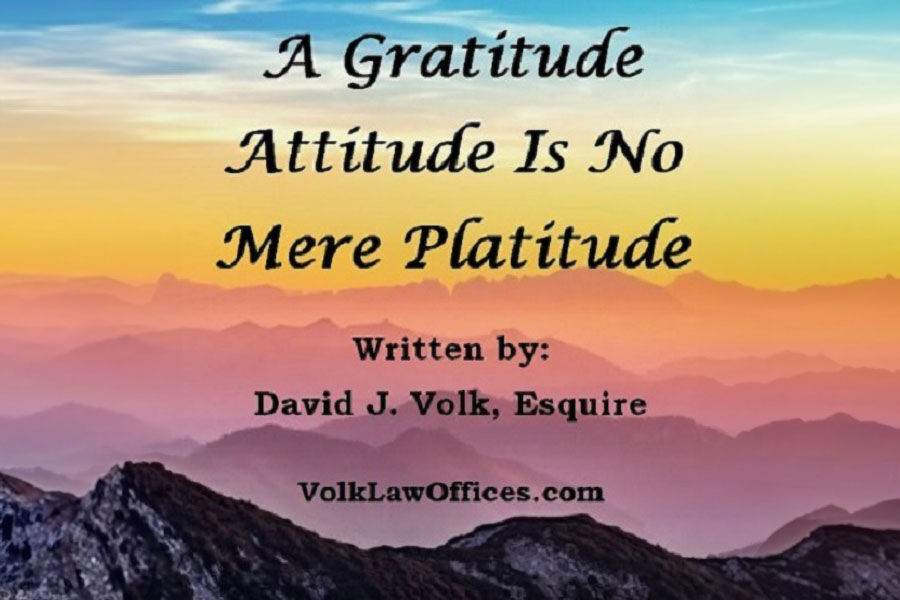A Gratitude Attitude Is No Mere Platitude
Posted: April 22nd, 2018
Written by: David J. Volk, Esq. | April 22, 2018
A gratitude mentality will bring you greater success and happiness. Why does that matter? How do you achieve it?
I began 2018 at a two-day conference lead by Michael Hyatt to launch his ninth book, Your Best Year Ever, and to educate attendees on goal setting and achievement of those goals. Michael has distilled wisdom in to a formula for designing goals that have a much greater chance of being achieved. I urge you to buy, read, and apply the lessons found in that book.
Before launching in to his methodology for building achievement and habit goals, Michael told us we must have the right foundation. One of the foundational piers we need to have is a sense of gratitude. “The truth is that you will never have more of what you want until you become thankful for what you have. Ingratitude creates instant victims in our culture of scarcity. But giving thanks for outrageous abundance inoculates us from the sense of fear, failure, and discontent we sometimes experience and instead creates a path towards success, joy, and fulfillment.” Your Best Year Ever, Page 97. He informs us we often become accustomed to what once brought delight and surprise. To avoid that mindset, think of something you once cherished in your life and reflect on how it made you feel. It will regain its special nature.
So, being told a gratitude mentality makes goal achievement easier, the difficulty of staying in that mentality has been nagging at me. Why is it so important? Are there ways to develop it if it does not come naturally? Let’s first reflect on what it is.
In Mindfulness and Positive Thinking, published in The Pursuit of Happiness, http://www.pursuit-of-happiness.org/science-of-happiness/positive-thinking/, we read:
(t)he great Roman orator Cicero wrote, “Gratitude is not only the greatest of virtues, but the parent of all the others.” Indeed, all of us can think of times in our lives when we’ve expressed heartfelt thanks to others for gifts of time and effort. Being grateful feels good. Gratitude, the state or feeling of being thankful, is an almost universal concept among world cultures. In fact, nearly all of the world’s spiritual traditions emphasize the importance of giving thanks to benefactors, supernatural or otherwise (Emmons & Crumpler, 2000†). Robert Emmons, a leader in the field of gratitude research, defines gratitude as the feeling that occurs when a person attributes a benefit they have received to another (Emmons, 2004). Feeling grateful has a number of benefits. Feelings of gratitude are associated with less frequent negative emotions and more frequent positive emotions such as feeling energized, alert, and enthusiastic (McCullough, Emmons, & Tsang, 2002). Beyond emotions, there is evidence that gratitude is associated with pleasant physical sensations, as well. Algoe and Haidt (2009) found that people experienced pleasant muscle relaxation when recalling situations in which they’d felt grateful. It is apparent that the mere act of giving thanks can have remarkable impact on a person’s well-being.
How Gratitude Can Make You More Successful, November 11, 2015, (http://www.humanfactorformula.com/blog/how-gratitude-can-make-you-more-successful) points to one of the most prominent researchers in this field, Dr. Robert A. Emmons, Ph.D. from the University of California, Davis, who describes gratitude giving people the following benefits:
Physical
- Stronger immune systems
- Less bothered by aches and pains
- Lower blood pressure
- Exercise more and take better care of their health
- Sleep longer and feel more refreshed upon waking
Psychological
- Higher levels of positive emotions
- More alert, alive, and awake
- More joy and pleasure
- More optimism and happiness
Social
- More helpful, generous, and compassionate
- More forgiving
- More outgoing
- Feel less lonely and isolated.
Wow! Give me a bunch of that gratitude thing! Gratitude should also be vocal at times. Being on the receiving end of gratitude is a joyful experience and when you lift someone up, they are likely to want to return the favor. And, if you verbalize something, it will stick with you longer since your brain must work a little harder to put the thought out there and you will probably enjoy seeing someone’s warm reaction to your kind thought.
As an employer who reads a lot about how to be a more effective boss, I am routinely reminded I need to be grateful for those that work for me. Now that advice is so widespread that it really is a platitude. It is easy to be like the guy who said, I routinely give certificates of appreciation to employees; they have pictures of Presidents on them. Still, I do have gratitude for my colleagues. We often collaborate on amazing things together, and they often solve problems before they even get to my desk.
On the other hand, if you have coworkers or a boss, how often do you express gratitude to those people? The Human Factor article cited above says 29% never thank a co-worker and 35% of employees never thank their boss. Never is a powerful word. The implied fact is that doing it routinely is not a habit for most people. Some think the boss has it easy with all that power and perks sloshing around. If you’re a boss, you know it is usually very difficult. Some think their co-workers have it easier. In fact, they probably have their own burdens that we don’t even think about. No job is easy.
So how do we get the gratitude attitude? Most importantly, gratitude is a choice. We must make a routine conscious effort to appreciate our blessings.
Robert Emmons, perhaps the world’s leading scientific expert on gratitude, also argues that gratitude has two key components: “First, it’s an affirmation of goodness. We affirm that there are good things in the world, gifts and benefits we’ve received.”
In the second part of gratitude, he explains, “we recognize that the sources of this goodness are outside of ourselves…We acknowledge that other people…gave us many gifts, big and small, to help us achieve the goodness in our lives.”’
In her book, Living in Gratitude: A Journey That Will Change Your Life, Angeles Arrien writes: “Gratitude is essentially the recognition of the unearned increments of value in one’s experience.” She goes on to say: “Gratitude is a feeling that spontaneously emerges from within. However, it is not simply an emotional response; it is also a choice we make. We can choose to be grateful, or we can choose to be ungrateful—to take our gifts and blessings for granted. As a choice, gratitude is an attitude or disposition.”
What is Gratitude?, The Gratitude Team, https://gratefulness.org/resource/what-is-gratitude/
Having made the choice, you must create the habit. Stop and smell the roses! Here are some suggestions for how to mindfully achieve gratitude.
Human Factors says:
- Keep a gratitude journal
- Write a thank-you note
- Create visual reminders
Hyatt says:
- Start and end each day with prayer
- Practice thankfulness
- Journal gratitude
These should be daily practices. Actions like that cause you to routinely pause and reflect and appreciate the blessings. That is where great growth can come from. Like so many valuable things in life, many of us need to work at this one. If you want to be better and have better outcomes in life and make those around you happier, give it a shot. You will be glad you did. Just don’t think it will come easy. This is a habit many of us must develop. New habits take time and effort. Michael Hyatt said it takes thirty days and up to two years of concerted effort to develop a good habit. If you keep working at it, incremental progress will occur until it becomes second nature. I’d say, “good luck,” but you don’t need luck, just a commitment and effort. That is what creates big winners.
You also must push out destructive thinking. Here is one the of the best ways to do that. Consider Diana Silva Mendez’ September 27, 2017 in How to Make Gratitude a Habit. https://www.silvamethod.com/how-to-make-gratitude-a-habit/.
Never compare yourself with other people. Nor should you make comparisons between other people. You never really know what is going on in a person’s life until you are in their shoes.
Social media can be misleading; people only share the best parts of their lives. So, it is no use if you keep comparing yourself to others and wallow in self-pity. It does nothing but destroys your self-esteem and confidence. This is a huge mental block for practicing gratitude. If you keep comparing yourself and focus on the things you do not have, you will never find a reason to be thankful.
When we break free of the curse of comparative living, we can look inward and appreciate what we have instead of what we don’t have.
This has been a fun topic for me. I could keep typing for hours, but I need to go do a little pausing and reflecting and appreciating my blessings. Take care.
David Volk, a Business Litigation Attorney with Volk Law Offices, P.A., has over 29 years’ experience and can be reached at help@volklawoffices.com or by visiting VolkLaw online at VolkLawOffices.com
The matters discussed here are general in nature and are not to be relied upon as legal advice. Every specific legal matter requires specific legal attention.
The law is constantly changing and matters discussed today may not be the same tomorrow. Legal matters are also subject to different interpretations by attorneys, judges, jurors and scholars. No attorney-client relationship is intended or created as a result of matters discussed here. You should consult counsel of your choice if you have any dealings in these areas of the law. Volk Law Offices, P.A. and its attorneys make no representations or warranties with respect to the accuracy or completeness of the matters addressed.

